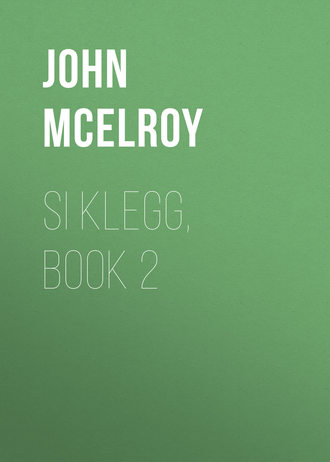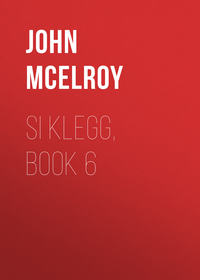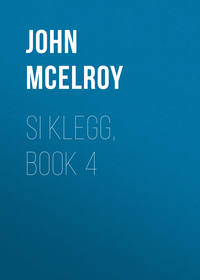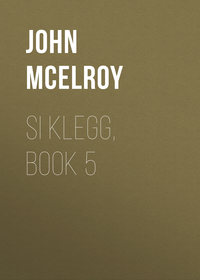 полная версия
полная версияSi Klegg, Book 2
"I couldn't 've made a doggoneder fool than Groundhog, that teamster," said Shorty, laying down his rail for a minute's rest, "if I'd 'a' had Thompson's colt before my eyes for a pattern. That feller was born addled, on Friday, in the dark of the moon."
"Them mules," dolefully corroborated Si, scraping an acre, more or less, of red Tennessee soil from his overcoat with a stick, "need to be broke again with a saw-log. Luck for old Job that the devil didn't think o' settin' him to drive mules. He'd 'a-bin a-goner in less'n an hour."
"Doggone it, here they come," said Shorty, snatching up his gun.
Si looked in the direction of Shorty's glance. Out of the cedars, a mile or more away, burst a regiment of rebel cavalry, riding straight for the front of the train.
With his tribe's keen apprehension of danger, Groundhog had jumped from his saddle, nervously unhitched his mule, and sprung into the saddle again, ready for instant fight.
"Get off and hook that mule up agin," commanded Si sternly. "Now get on your mule and go to the head of your team, take the leaders by the bridles, and stay there."
"If you ain't standing there holding your mules when we come back I'll break your worthless neck."
The bugle sounded "Rally on the right flank," and Si and Shorty joined the others in a lumbering rush over the miry fields toward the right. Their soaked clothes hung about them like lead. They had not a spoonful of breath left when they got to where, half-a-mile away, Co. A had taken a position in the briers behind a rail fence, and had opened a long-ranged fire on the cavalry, which was manuvering as if trying to discover a way to take the company in flank. Another fence ran at right angles away to the right of Co. A's position. The cavalry started for that.
"Capt. McGillicuddy," shouted the Colonel, "take your company back to that fence as quick as you can, run along back of it, and try to keep those fellows on the other side."
Away the panting company rushed for the fence. The field was overgrown with those pests of the Southern plowman, called locally "devil's shoe strings," which stretch from furrow-ridge to furrow-ridge, and are snares to any careless walker. The excited Indianians were constantly tripped on these, and fell headlong in the mud. Down Si and Shorty went several times, to the great damage of their tempers. But in spite of all rain, mud, lack of breath and devil's shoe-strings the company got to the fence in advance of the cavalry, and opened a scattering fire as each man could get his damp gun to go off. Si and Shorty ran back a little to a hillock, from which they could get long-distance shots on where the cavalry would probably try to tear down the fence.
"It's all of 600 yards, Si," said Shorty, as he leaned against a young oak, got his breath back in long gulps, and studied the ground. "We kin make it, though, with our Springfields, if they'll give us time to cool down and git our breaths. I declare I want a whole Township of fresh air every second. That last time I fell knocked enough breath out o' me to fill a balloon."
"There, they're sendin' out a squad now to go for the fence," said Si, putting his sight up to 600 yards. "I'll line on that little persimmon tree and shoot as they pass it. I'll take the fellow on the clay bank horse, who seems to be an officer. You take the next one on the spotted bay."
"Better shoot at the hoss," said Shorty, fixing his sight. "Bigger mark; and if you git the hoss you git the man."
The squad made a rush for the fence, but as the leader crossed the line Si had drawn on the persimmon tree through his sights, his musket cracked, and the horse reared and fell over in the mud. Shorty broke the shoulder of the next horse, and the rider had to jump off.
"Bully shots, boys. Do it again," shouted the Captain of Co. Q, hurrying some men farther to the right, to concentrate a fire upon the exposed point.
Si and Shorty hastily reloaded, and fired again at the rebels, who had pressed on toward the fence, in spite of the fall of their leader. But not having an object in line to sight on, Si and Shorty did not succeed in bringing anybody down. But as they looked to see the effect, they also saw a cannon-flash from a hill away off behind the cavalry, and the same instant its rifled shot took the top off the young oak about six feet above Si's head.
Shorty was the first to recover his wits and tongue. "Doggoned if somebody else hain't been drawin' a bead on trees," he said, looking into Si's startled face. "Knows how to shoot, too."
"I didn't notice that measly gun come up there. Did you, Shorty?" said Si, trying to get his heart back out of his mouth, so that he could speak plainly.
"No. I didn't. But it's there all the same, and the fellers with it have blood in their eyes. Le's run over to where the other boys are. I'm a private citizen. I don't like so much public notice."
They joined the squad which was driving back the rebels who had started out to break the fence.
Presently the cavalry wheeled about and disappeared in the woods. The rear was scarcely out of sight, and the 200th Ind. was just beginning to feel a sense of relief, when there was a sputter of shots and a chorus of yells away off to the extreme left.
"Just as I expected," grumbled Shorty. "They are jumping the rear of the train now."
Leaving Co. A to watch the head of the train, the rest of the regiment bolted off on the double-quick for the rear. They did not get there a moment too soon. Not soon enough, in fact. As they came over the crest of the hill they saw Co. B, which had been with the rear, having more than it could attend to with a horde of yelling, galloping rebels, who filled the little valley. Co. B's boys were standing up manfully to their work, and popping away at the rebels from behind fences and rocks, but the latter had already gotten away from them a wagon which had been far to the rear, had cut loose the mules and run them off, and were plundering the wagon, and trying to start a fire under it.
The fusillade which the regiment opened as the men grained the crest of the hill, put a different complexion on the affair. The rebels recognized the force of circumstances, and speedily rode back out of range, and then out of sight. As the last of them disappeared over the hill the wearied regiment dropped down all around to rest.
"We can't rest long, boys," said the sympathetic Colonel; "we've got to start these wagons along."
Presently he gave the order:
"Go back to your wagons, now, and get them out as quickly as you can."
Si and Shorty took a circuit to the left to get on some sod which had not been trampled into mortar. They heard a volley of profanity coming from a cedar brake still farther to the left, and recognized the voice of their teamster. They went thither, and found Groundhog, who had fled from the scene, after the manner of his race, at the first sound of firing, but had been too scared to fasten up his traces when he unhitched his saddle mule. These had flapped around, as he urged his steed forward, and the hooks had caught so firmly into the cedars when he plunged into the thicket that he was having a desperate time getting them loose.
"You dumbed, measly coward," said Si. "I told you I'd blow your head offen you if you didn't stay by them mules. I ought to do it."
"Don't, Si," said Shorty. "He deserves it, and we kin do it some other time. But we need him now in our business. He hain't much of a head, but it's all that he's got and he can't drive without it. Le's git the mule loose first."
They got the mule out and turned him around toward the wagons.
"Now," said Shorty, addressing Groundhog, "you white-livered son-in-law of a jackass, git back to that wagon as fast as you kin, if you don't want me to run this bayonet through you."
There was more straining and prying in the dreary rain and fathomless mud to get the wagons started.
"Shorty," said Si, as they plodded alongside the road, with a rail on one shoulder and a gun on the other, "I really believe that this is the toughest day we've had yet. What d'you s'pose father and mother'd say if they could see us?"
"They'd probably say we wuz earning our $13 a month, with $100 bounty at the end o' three years.," snapped Shorty, who was in no mood for irrelevant conversation.
So the long, arduous day went. When they were not pulling, pushing, prying, and yelling, to get the wagons out of mudholes, they were rushing over the clogging, plowed fields to stand off the nagging rebel cavalry, which seemed to fill the country as full as the rain, the mud, the rocks and the sweeping cedars did. As night drew on they came up to lines of fires where the different divisions were going into line-of-battle along the banks of Stone River. The mud became deeper than ever, from the trampling of tens of thousands of men and animals, but they at least did not have the aggravating rebel cavalry to bother them. They found their division at last in an old cottonfield, and were instantly surrounded by a crowd of hungry, angry men.
"Where in blazes have you fellers bin all day?" they shouted. "You ought to've got up here hours ago. We're about starved."
"Go to thunder, you ungrateful whelps," said Si. "You kin git your own wagons up after this. I'll never help guard another wagon-train as long as I'm in the army."
CHAPTER VI. BATTLE OF STONE RIVER
THE 200TH IND. IS PRAISED FOR BRAVERYTHE fagged-out 200th Ind. was put in reserve to the brigade, which lay in the line-of-battle. After having got the train safely into camp, the regiment felt that it was incapable of moving another foot.
While their coffee was boiling Si and Shorty broke off a few cedar branches to lay under them, and keep out the mud. The rain still drizzled, cold, searching and depressing, but they were too utterly tired to do anything more than spread their over coats on the branches, lay their blankets and ponchos over, and crawl in between.
In the few minutes which they allowed to elapse between getting into camp and going to sleep they saw and heard something of the preparations going on around them for the mighty battle, but body and brain were too weary to properly "sense" these. They hardly cared what might happen to-morrow. Rest for to-day was everything. They were too weary to worry about anything in the future.
"It certainly looks, Shorty," said Si, as he crawled in, "like as if the circus was in town, and the big show'd come off to-morrow, without regard to the weather."
"Let it come and be blamed to it," snorted Shorty. "They can't git up nothin' wuss'n we've bin havin' to-day, let them try their durndest. But I tell you, Mr. Si Klegg, I want you to lay mighty still to-night. If you git to rollin' around in your usual animated style and tanglin' up the bedclothes, I'll kick you out into the rain, and make you stay there. Do you hear me?"
"You bet I'll lay quiet," said Si, as together they gave the skillful little kick only known to veteran campaigners by which they brought the blankets snugly up around their feet. "You could sooner wake up a fence-rail than me. I want to tell you, too, not to git to dreamin' of pryin' wagons out of the mud, and chasin' rebel cavalry. I won't have it."
The reveille the next morning would have promptly awakened even more tired sleepers than Si and Shorty. Even before the dull, damp drums began rolling and the fifes shrieking the air of enforced gaiety along the sinuous line of blue which stretched for miles through red, muddy cottonfields and cedar tangles wet as bath-room sponges, there came from far away on the extreme right a deepening roll of musketry, punctuated with angry cannon-shots and the faint echo of yells and answering cheers.
"That's McCook opening the battle," said the officers, answering the anxious looks of the men. "He's to hold the rebels out there, while Crittenden sweeps around on the left, captures Murfreesboro, and takes them in the rear."
Miles away to the left came the sound of musketry and cannons, as if to confirm this. But the firing there died down, while that to the right increased with regular, crashing volleys from muskets and artillery.
The 200th Ind. was in that exceedingly trying position for soldiers, where they can hear everything but see nothing. The cedar thicket in which they stood shut off the view in every direction. The Colonel kept officers and men standing strictly in place, ready for any contingency. Si and Shorty leaned on their muskets and anxiously watched the regimental commander as he sat rigidly in his saddle, with his fixed gaze bent in the direction of the awful tumult. The Adjutant had ridden forward a little ways to where he could get a better view. The other officers stood stiffly in their places, with the points of their drawn swords resting on the ground, and their hands clasped on the hilts, and watched the Colonel intently. Sometimes they would whisper a few words to those standing near them. The Captain of Co. Q drew geometric figures in the mud with the point of his sword.
Constantly the deafening crash came nearer, and crept around farther to the right.
Si gave a swift glance at Shorty. His partner's teeth were set, his face drawn and bloodless, his eyes fixed immovably on the Colonel.
"Awful fightin' goin' on out there, Shorty," said Si, in hushed voice. "I'm afraid they're lickin' our fellers."
"Confound it!" snorted Shorty, "why in thunder don't they move us out, and give us something to do? This is hell standin' here listenin'."
A teamster, hatless and coatless, with his hair standing up, came tearing through the brush, mounted on his saddle-mule.
A chorus of yells and curses greeted his appearance. It was immense relief for the men to have something to swear at.
"Run, you egg-sucking hound. "Run, you scald-headed dominie."Somebody busted a cap in your neighborhood, old white-liver."
"Seen the ghost of a dead rebel, Pilgarlic?"
"Pull back your eyes, you infernal mulewhacker. A limb'll brush 'em off."
"Look at his hair standin' up stiffer'n bristles on a boar's back."
"Your mules got more sand 'n you. They're standing where you left 'em."
"Of course, you're whipped and all cut to pieces. You was that when you heard the first gun crack."
"Get out of the way, and let him run himself to death. That's all he's fit for."
"You've no business in men's clothes. Put on petticoats."
"Go it, rabbit; go it, cotton-tail you've heard a dog bark."
"Chickee chickee skip for the barn. Hawk's in the air."
"Let him alone. He's in a hurry to get back and pay his sutler's bill."
The teamster gasped out:
"You'd better all git out o' here as fast as the Lord'll let you. Johnson's Division's cut all to pieces and runnin'. There'll be a million rebels on top o' you in another minnit."
"Capt. McGillicuddy," said the Colonel sternly, but without turning his head, "either bayonet that cowardly rascal or gag him and tie him to a tree."
The Captain turned to give the order to Corp'l Klegg, but the teamster struck his mule with his whip, and went tearing on through the brush before the order could be given.
Some severely-wounded men came slowly pushing their way through the chaparral.
"It's awful hot out there," they said. "The rebels got the start of us, and caught our battery horses off to water. They outflanked us bad, but the boys are standin' up to 'em and they're gettin' help, an 'll lick the stuffin' out of 'em yet."
The regiment gave the plucky fellows a cheer.
A riderless horse, frantic from his wounds and the terrific noise, tore through the brush, and threatened to dash over Co. Q. Si and Shorty saw the danger, and before the Captain could give an order they sprang forward, and, at considerable risk, succeeded in getting hold of the reins and partially calming the poor brute. The eagles on the saddle cloth showed that he belonged to a Colonel. He was led to the rear, and securely haltered to a young cedar. The incident served a purpose in distracting for awhile the attention of the regiment.
The noise in front and to the right swept farther away for a little while, and the men's hearts rose with a cheer.
"Now the reinforcements are getting in. Why in the world don't they send us forward?" they said.
The Colonel still sat rigidly, with his face straight to the front.
Then the noise began to roll nearer again, and the men's hearts to sink.
The wounded men coming back became a continuous procession. They spoke less confidently, and were anxious to know what was taking place on other parts of the line.
"The whole infernal Southern Confederacy's out there," said one boy, who was holding his shattered right hand in his left, with his thumb pressed hard on the artery, to stanch the blood, "in three lines-of-battle, stretching from daybreak to sunset. The boys have been standing them off bully, though, but I don't know how long they can keep it up. Thomas and Crittenden ought to be walking right over every thing, for there can't be anybody in front of them. They're all out there."
Two musicians came laboring through, carrying a stretcher on which was an officer with part of his face shot away. Si felt himself growing white around the mouth and sick at the stomach, but he looked the other way, and drew in a long, full breath.
The storm now seemed to be rolling toward them at railroad speed. Suddenly the woods became alive with men running back, some with their guns in their hands, many without. Some were white with fear, and silent; some were in a delirium of rage, and yelling curses. Officers, bareheaded, and wildly excited, were waving their swords, and calling regiments and companies by name to halt and rally.
The Adjutant came galloping back, his horse knocking the fugitives right and left. He shouted, to make himself heard in the din:
"The whole division is broken and going back. Our brigade is trying to hold the rebels. They need us at once."
The Colonel turned calmly in his saddle, and his voice rang out clear, distinct, and measured, as if on parade:
"Attention, 200th Indiana!"
"Load at will LOAD!"
A windrow of bright ramrods flashed and weaved in the air. A wave of sharp, metallic clicks ran from one end of the line to the other.
"Shoulder ARMS!"
"Right FACE!"
"Forward MARCH!"
What happened immediately after emerging from the cedars Si could never afterward distinctly recall. He could only vaguely remember as one does the impression of a delirium seeing, as the regiment swung from column into line, a surging sea of brown men dashing forward against a bank of blue running along a rail fence, and from which rose incessant flashes of fire and clouds of white smoke. The 200th Ind. rushed down to the fence, to the right of the others; the fierce flashes flared along its front; the white smoke curled upward from it. He did not remember any order to begin firing; did not remember when he began. He only remembered presently feeling his gun-barrel so hot that it burned his hand, but this made him go on firing more rapidly than before. He was dimly conscious of his comrades dropping around him, but this did not affect him. He also remembered catching sight of Shorty's face, and noticing that it was as black as that of a negro, but this did not seem strange.
He felt nothing, except a consuming rage to shoot into and destroy those billows of brown fiends surging incessantly toward him. Consciousness only came back to him after the billows had surged back ward into the woods, leaving the red mud of the field splotched with brown lumps which had lately been men.
As his mind cleared his hand flinched from the hot gun-barrel, and he looked down curiously to see the rain-drops turn into steam as they struck it. His throat was afire from the terrible powder thirst. He lifted his canteen to his lips and almost drained it. He drew a long breath, and looked around to see what had happened since they left the cedars. Shorty was by his side, and unhurt. He now under stood why his face was so black. He could feel the thick incrustation of powder and sweat on his own. Several of Co. Q were groaning on the ground, and the Captain was detailing men to carry them back to where the Surgeon had established himself. Two were past all surgery, staring with soulless eyes into the lowering clouds.
"Poor Bill and Ebe," said Si, gazing sorrowfully at the bodies. "Co. Q will miss them. What good boys they—"
"Were" stuck in his throat. That those strong, active, ever-ready comrades of a few minutes before now merely "were" was unspeakable.
His thoughts were distracted by a rebel battery on the hill sending a volley of shells at the fence. Some went over, and tore gaps in the cedars beyond. One struck the corner of the fence near him, and set the rails to flying.
"I like fence-rails in their place as well as any man," said Shorty, as they dodged around; "but a fence-rail's got no business sailin' 'round in the air like a bird."
An Aid rode up to the Colonel.
"The General's compliments, Colonel. He directs me to express to you his highest compliments on the splendid manner in which you have defended your position. You and your men have done nobly. But we are outflanked, and it will be necessary to retire to a new position about a half-mile to the rear. You will withdraw your regiment by companies, so as to attract as little attention from the enemy as possible. As soon as they are under cover of the cedars you will move rapidly to the new position."
"Very well," said the Colonel, saluting. "You will be good enough to say to the General that my men and myself appreciate highly his praise. We are proud to receive it, and shall try to deserve it in the future. His orders shall be immediately obeyed."
"They call this a civil war," said Shorty, as an other volley of shells tore around. "Seems to me sometimes that it's too durned civil. If we're goin' to git out of here, we might save compliments for a quieter time."
One by one the companies filed back into the cedars, Co. Q being last. Just as they started the rebels on the opposite hill discovered the movement, raised a yell, and started across the field.
"Halt Front!" commanded the Captain. "Those fellows are too tumultuous and premature. We must check them up a little. Wait till they come to that little branch, then everybody pick his man and let him have it. Aim below the belt."
The frenzy of the first struggle was now gone from Si's mind; instead had come a deadly determination to make every shot tell.
"I'm goin' to fetch that mounted officer on their right," he said to Shorty and those around him.
"Very well," said Shorty. "I'll take that Captain near him who's wavin' his sword and yellin'. The rest o' you fellers pick out different men."
The rebel line was in the weeds which bordered the branch when the Captain gave the order to fire.
When the smoke arose the mounted officer and the yelling Captain were down.
"If somebody else didn't get them, we did," said Shorty, as they turned and rushed back into the cedars.
The rebels were only checked momentarily. They soon came swarming on, and as Co. Q crashed through the cedars the rebels were yelling close be hind. Fortunately, they could not do any effective firing, on account of the brush. But when they came to the edge of the thicket there was a long run across a furrowed, muddy cottonfield, to reach the knoll on which the brigade was re-forming. The battery was already in action there, throwing shells over the heads of Co. Q at the rebels swarming out of the cedars in pursuit.
Si and Shorty threw away overcoats, blankets, haversacks and canteens everything which would impede their running, except their guns and cartridge-boxes. Their caps were gone, and Si had lost one shoe in the mud. They all sat down on the ground for a minute and panted to get their breath.
The rebels were checked, but only temporarily. They were thronging out in countless multitudes, lining up into regiments and brigades, preparatory to a rush across the field upon the brigade. Away to the right of the brigade rebel batteries had been concentrated, which were shelling it and the ground to the rear, to prevent any assistance being sent it.
"Captain," said the Colonel, riding up to Co. Q, "the General says that we have got to stay here and hold those fellows back until the new line can be formed along the pike. We haven't ammunition enough for another fight. You'll have to send a Corporal and a squad back to the pike to bring up some more. Pick out men that'll be sure to come back, and in a hurry."









